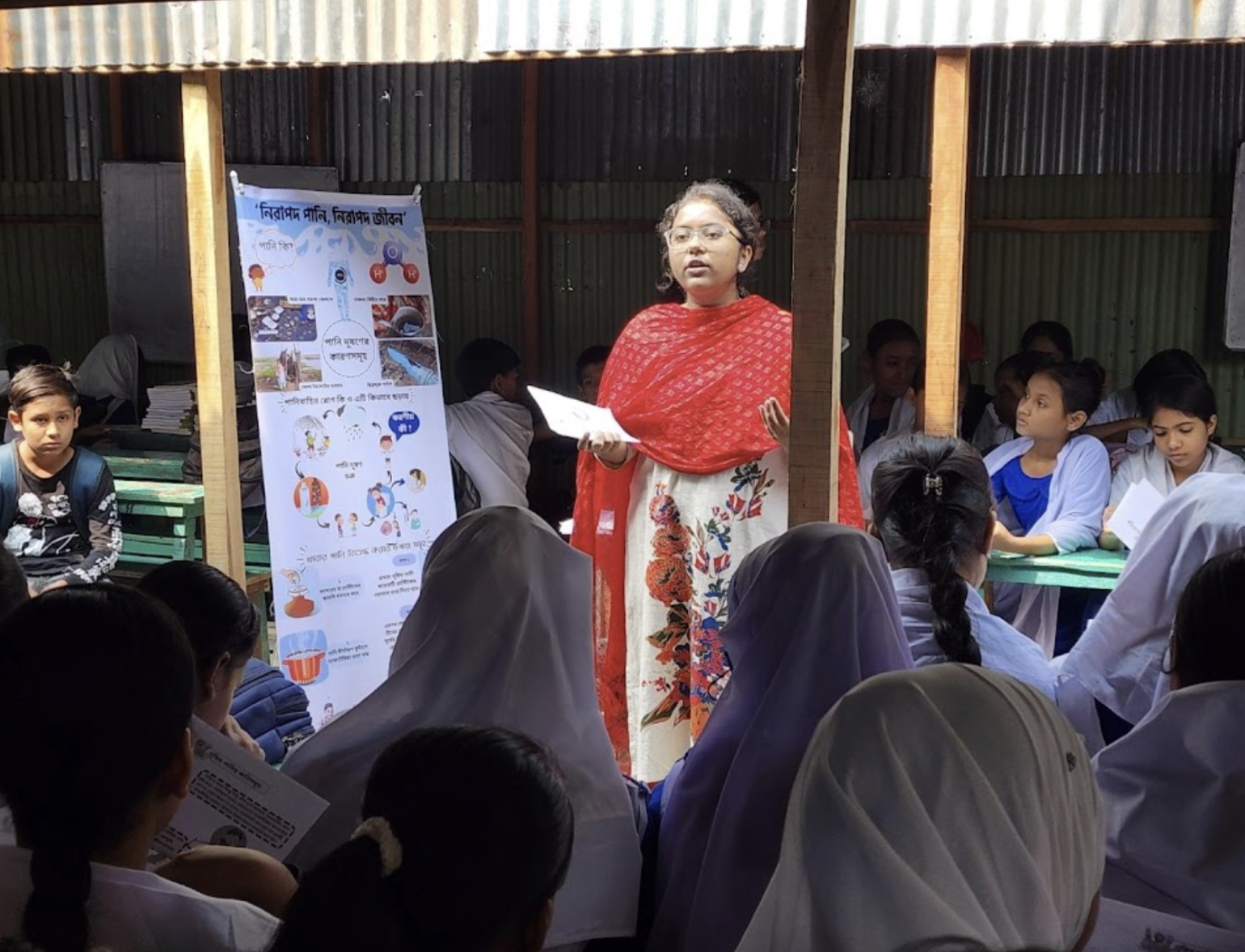EcoFlow Revive: From Student Initiative to Sustainable Impact
Article by: Social Impact Lab, BRAC University
EcoFlow Revive is an in-house, student-led, community-driven under Social Impact Lab, BRAC University, committed not only to restoring Banani Lake, one of Dhaka’s most polluted urban water bodies, but also to mitigating and establishing adaptable community-based mechanisms to prevent waterborne diseases among children in the surrounding Korail community. Through the implementation of an advanced water purification technology and inclusive local engagement, EcoFlow Revive has evolved from a student idea into an institutionalized program under the Social Impact Lab (SIL). This institutionalization ensures long-term sustainability, access to university resources, and continued youth-led innovation in water conservation and public health.
Current Initiative of EcoFlow Revive: Year-Long Bilateral WASH Education Training Program
In 2025, EcoFlow Revive launched a Year-Long Bilateral WASH (Water, Sanitation, and Hygiene) Education Campaign, aligning with SDGs 3, 6, 8, 10, and 14. The initiative combines capacity-building, community engagement, and participatory education to promote hygiene awareness and behavioral change among students in slum-based schools in Korail, Mohakhali.
Key features include:
Training of Trainers (ToT): Five extensive Training of the Trainers(ToT) programs with fifteen BRAC University volunteers trained on six interlinked WASH components by national experts.
School-Based Workshops: Fifteen interactive training workshops with playful activities promoting sustainable water, sanitation, and hygiene practices among adolescents.
Sustainability Measures: A WASH Integration Toolkit and an environment club formation in each school to be adopted by other local schools for long-term replication and scale-up.
Fellow Spotlight: A Conversation with Lamisa Manha, Cofounder, EcoFlow Revive
Q: What motivated you to engage with urban slum communities through EcoFlow Revive?
When asked how EcoFlow Revive began, Lamisa, a former fellow of Millennium Fellowship, explained, “Honestly, it started as part of my daily routine.” She described how, since the university is just near Banani Lake, she would pass by the nearby slum every day and witness the struggles of the community. “I saw children playing near polluted water, families struggling with sanitation, and people carrying buckets of unsafe water to their homes,” she said. At first, she admitted, “I just felt sad—but soon I realized that feeling sad wasn’t enough.” That realization led her to talk with a few classmates, and together, they decided to take responsibility. “That’s how EcoFlow Revive began: from noticing a problem on our way to campus to actually doing something about it,” she addressed.
Q: Can you tell us about the challenges these communities face?
The challenges Lamisa described are enormous. Over 3.5 million people in Dhaka—almost 40% of the city’s population—live in slums. Near the lake, families cram into tiny rooms, often without proper toilets or clean water. The fellow pointed out that around 26% of households in Dhaka’s slums lack sanitary toilets, and 70% have no access to sewerage systems. “Passing by every day made these numbers real,” she said. “Seeing kids fall sick from dirty water is something you don’t forget.”
Q: How did you and your cofounders respond to what you were seeing?
In response to the question about the first steps they took, Lamisa said, “We decided to act immediately.” She explained, “We started small, organizing awareness sessions about hygiene and clean water with the families we could reach.” She mentioned that they also “coordinated with local NGOs to provide basic WASH kits,” and over time, “our initiative grew into regular workshops and community programs.” She was mindful about the difficulties: “It wasn’t easy—sometimes logistics failed, sometimes people were skeptical—but taking responsibility for a problem you witness every day keeps you committed.”
Q: How has this experience shaped your understanding of leadership and social impact?
Lamisa reflected deeply on what leadership truly means, saying, “I’ve realized leadership isn’t about giving orders; it’s about creating emotional connection to empower others to act.” She emphasized the importance of listening: “We had to listen to community members, understand their needs, and work alongside them, not just for them.” She also shared a key lesson she learned through the work: “Sustainable change takes patience, persistence, and humility—it’s not always glamorous, but it’s real.” Her words capture a vision of leadership rooted in respect, care, and ethical responsibility, where impact is measured not by authority but by the meaningful difference made in people’s lives.
Q: What message do you have for other university students?
She also reflected on what she hopes others take away from their work: “Look around you—sometimes the biggest issues are right outside your classroom. You don’t need a perfect plan or massive resources to start. Care combined with action is powerful. Even small steps—teaching kids to wash their hands properly, cleaning a polluted area, or raising awareness—can ripple into lasting change. Honestly, I wish more of us realized that sooner.”
She also shared a moment that made all their efforts feel real. “After conducting a WASH workshop, Rima, a 20-year-old student from Korail, began teaching younger children about girls' menstrual management,” she said. “Seeing her take initiative and share what she learned reminded us why every small step matters.”
Beyond the Fellowship: Impact in Motion
Since its inception, EcoFlow Revive has:
Engaged over 2000+ community members through awareness campaigns
Partnered with Awareness 360, JCI Dhaka Independent, UNDP Bangladesh, UNICEF Bangladesh, and DSK Bangladesh for expert facilitation
Developed a preventive toolkit against water-borne diseases and youth-led research initiatives
Built a student pipeline for long-term environmental and health advocacy
Join the Flow
EcoFlow Revive continues to grow as a model for youth-led environmental and health action in Bangladesh.
For collaborations or insights, reach out at ecoflowrevive.official@gmail.com


